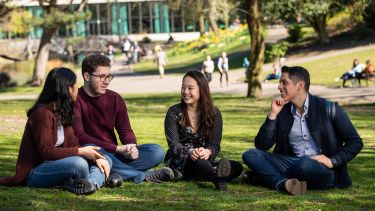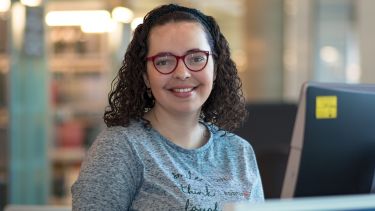MA student Ana Paula Biazon Rocha on why she chose Sheffield

She holds a BA in English and Portuguese Language and Literature from the University of Sao Paulo, a TESOL Certificate by ILAC Canada among other degrees. She has been teaching English in monolingual classes for about 15 years and has recently started to teach TESOL at the English Language Teaching Centre (ELTC) at the University of Sheffield.
Why did you choose to study at the University of Sheffield?
I chose the University of Sheffield for my masters course because I had heard about its high quality within the UK, its diverse curriculum and was looking for a chance to enhance my linguistic and teaching knowledge of the English language. I considered it a great opportunity to improve my academic skills.
What made the University of Sheffield stand out for you?
I was trying to find the best way to develop my academic career and found in the University of Sheffield great support and means to do so. It has brought me closer to the details of researching and analysing articles and publications in the area critically.
In my view, the university atmosphere provided here inspires us to study and expand our knowledge.
What are you currently researching as part of your MA dissertation?
Due to my EFL teaching experience and my interest in Linguistics, I tried somehow to combine both by researching and designing a course on pronunciation learning and teaching for English teachers.
My initial context is Brazil since through the years I have noticed my fellow teachers and myself struggling to teach such a vital linguistic skill.
As we are non-native speakers of English, at times we may feel unsure of helping students with pronunciation because we may not entirely rely on our own pronunciation.
The university atmosphere provided here inspires us to study and expand our knowledge.
Ana Paula Biazon Rocha
MA Applied Linguistics with TESOL
Thus, the idea is to support teachers and show them what they can do to improve their pronunciation so that they are able to guide their students to acquire intelligible pronunciation of the language, not to imitate native speakers but to be understood and understand when engaging in communication in English worldwide. I also hope that the course I am designing can be adapted to English teachers in other contexts.
How did the School of English help support you through the whole process from application to settling in?
I have always been given help by the professors in our department during lectures and in their office hours, especially Professor Nigel Harwood, and my dissertation supervisor Dr. Saeede Haghi, concerning any questions I have or discussing any ideas that might come up.
I also find it practical to keep in touch with the reception of our School anytime I need some guidance from them.
Tell us about being a postgraduate in the department.
It always means hard work. Besides preparing for and attending classes, there is a large quantity of reading to be done daily. You must keep up with the different topics and contents being discussed in the lectures, seek help and advice from the professors whenever you need, and keep your schedule organised.
It also helps if you engage in group studies as you can get closer to your classmates, and the sharing of ideas and questions is really fruitful. You ought to prepare for your assignments and dissertation as early as possible so that you can read and study a variety of sources beforehand as well as keep your notes updated to facilitate the writing of your final draft before submitting it.

International postgraduate taught scholarships
We're offering scholarships worth up to £3,000 to international students joining the University to study a taught masters programme in September 2026.

